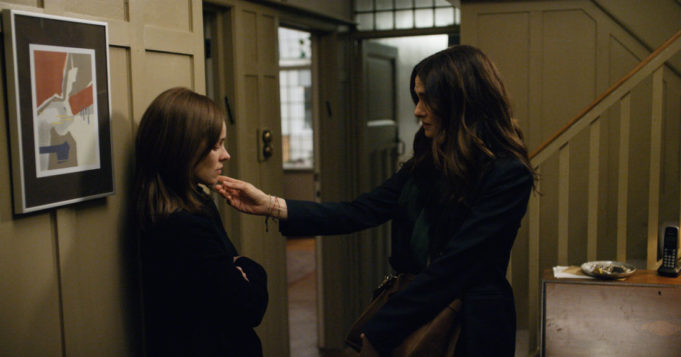You probably know the name Sebastián Lelio from his Oscar win for Best Foreign Film this past spring for A Fantastic Woman. Now, his first English-language film, Disobedience, is another LGBT love story set in a hostile environment, and I find it even better, because its setting bound by rules and customs and traditions so neatly fits his austere, quietistic artistry. It plays at the Modern Art Museum of Fort Worth this weekend.
Based on Naomi Alderman’s novel, the movie begins in an Orthodox Jewish synagogue in London, where an elderly rabbi (Anton Lesser), who’s been honored with the title of “Rav” for his wisdom and inspirational leadership, collapses in the middle of services and dies. His only child, Ronit Krushka (Rachel Weisz), returns from self-exile in New York, where she’s an Annie Leibovitz-like portrait photographer, to set her father’s affairs in order. Her biggest shock is finding that Esti (Rachel McAdams), whom she was madly in love with in their youth, is not only still in the Orthodox community but has married Ronit’s cousin, Rabbi Dovid Kuperman (Alessandro Nivola), who’s being groomed to replace the Rav. What’s more, Esti is still carrying a torch for Ronit. The fourth player in this triangle is God — Hashem, as he’s called here — with whom everyone has to make their own peace.
If you’ve seen any of Lelio’s previous films (all made in his native Chile), you’ll easily recognize his clipped, carefully controlled style here. The scene changes always seem to arrive a few seconds before you expect them, but they are timed perfectly in retrospect. If he overdoes the drab visuals here, he more than compensates for that with his gimlet-eyed observations of this world segregated by gender, where time is marked by weekly and daily religious rituals. That world stays with Ronit in New York, and there’s a great montage of her reacting to the news of her father’s death by getting smashed in a bar, weeping during sex with some random guy, ice-skating robotically around a rink, and finally tearing her blouse in the traditional Jewish rending of the garments. The only sign of modernity in the Orthodox world is when the two women find a radio in the Rav’s house and Ronit tunes it until she hears a song by The Cure. (This movie uses “Lovesong” the way Moonlight used “Hello Stranger.”) Lelio surely deserves some sort of recognition for the way he films a scene when Ronit and Esti go to a hotel on the other side of London to finally have sex — it’s the hottest sex scene you’ve ever seen without actual nudity.
Lesser makes the most out of the half of a speech that he’s given here, and Nivola gets a terrific monologue late on, as the rabbi tries to speak at the Rav’s funeral while his own domestic life is disintegrating. Still, the flashiest role here belongs to McAdams. She’s marvelously held in here, with a British accent and the look of hunted prey as she navigates the gossip of this closed-off community. Yet Esti loves this supportive community and needs it as much as she needs Ronit, and you can see the way this conflict tears at her when Dovid confronts his wife and she cries out, “I’ve always wanted this!” while looking utterly miserable. At the risk of sounding like a critical chestnut, if you watch McAdams’ work here next to her comic dynamo of a performance in Game Night, you won’t believe it’s the same actor.
Perhaps the repressed atmosphere won’t be to your taste; there are some viewers who don’t like Carol for the same reason. Or perhaps you won’t find the ending satisfying, as Esti has to make a compromise that will keep her faith with Hashem without being torn apart by her love for Ronit. (I will say I find it more satisfying than the book’s ending.) Regardless of these, the craftsmanship of Lelio’s filmmaking and the simmering passions of these performances deserve an audience.
Disobedience
Starring Rachel Weisz and Rachel McAdams. Directed by Sebastián Lelio. Written by Sebastián Lelio and Rebecca Lenkiewicz, based on Naomi Alderman’s novel. Rated R.












